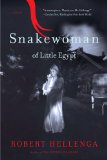Summary | Excerpt | Reading Guide | Reviews | Beyond the Book | Readalikes | Genres & Themes | Author Bio

Critics' Opinion:
Readers' Opinion:
First Published:
Sep 2010, 352 pages
Paperback:
Sep 2011, 352 pages
 Book Reviewed by:
Book Reviewed by:
Judy Krueger
Buy This Book
Living in the Garden of Eden. Not figuratively, but literally. That's
what Claude had concluded, and that was what he wanted Jackson to
convey to the learned world. But it was a huge job. Jackson would
have to decipher Claude's baroque French handwriting, and then
he'd have to edit what was essentially a collection of disjointed field
notes. And there were other problems. He didn't want to make
himself a laughingstock, or damage Claude's legacy.
Claude's reputation rested on a series of authoritative ethnographies,
written in French and subsequently translated into all the
major Europe an languages, of the various "pygmy" peoples of central
and western Africa - the Batwa, the Bayaka, the Bagyeli, and
finally, the Bambuti. ("Ba" simply means "people.") But recently
Claude's work had come under attack by other anthropologists: for
understating serious problems, such as the persecution of old women
for being witches or the unequal treatment of women in general, or
for treating wife beatings, abuse of animals, and quarrels that escalated into violence in a tone of lighthearted amusement. What
would happen now to Claude's legacy if his claim - which he had
never published - to have located the Garden of Eden, right on the
border between Uganda and the Demo cratic Republic of the Congo,
came to light?
Jackson's own more modest reputation rested on his book My
Life as an Mbuti, which had drawn the ire of fellow anthropologists. Why? Because Jackson hadn't played by the rules. On the one hand, he'd been too involved with the natives to see them clearly; the book was too subjective. On the other hand, he'd made the cardinal mistake of the old anthropology by assuming that Mbuti culture enacted a set of values and norms and cognitive frameworks and then by reifying conceptually convenient binary oppositions instead of unpacking and problematizing them.
But what really frosted his critics was that My Life as an Mbuti had been a national best seller and that in it Jackson had revealed what many anthropologists regarded as a dirty little secret that ought to be kept a secret: he'd slept with the natives. One of the natives. Sibaku, daughter of Asumali, the great storyteller, and Makela, who supervised the elima.
If you'd asked Jackson who the president of the United States was
when he came out of the Forest, he wouldn't have been able to tell
you, wouldn't have known that Reagan had defeated Mondale in a
landslide, or that Gorbachev was the new leader of the Soviet Union
or that Indira Gandhi had been assassinated by one of her bodyguards, or that the Challenger had exploded off the coast of Florida after one of the O-ring seals failed at liftoff.
He had applied for a visa to return to Africa shortly after his return
to the States - he wanted to see Sibaku, and he wanted to see
his daughter - but his request had been denied. He hadn't been
able to produce a notarized letter from a host or friend in what was
then Zaire, and with Claude dead and Camp Rameau abandoned, he
wasn't likely to get one. He'd been persona non grata, and neither
the State Department nor Mobutu's government was interested in
having him return. But Mobutu's government had been overthrown
in 1997 by Laurent- Désiré Kabila and had become the Democratic
Republic of the Congo. Kabila, a man with a reputation for burning
his critics alive at the stake, was promising reforms, but the borders
with Uganda and Rwanda were too unstable. Travel warnings
had been issued. A cease- fire had been signed in July between
Kabila and the Uganda- and Rwanda- backed rebels, but there was
no question of trying to get across the border from Uganda or
Rwanda. Or from Sudan. If he got someone to ferry him across the
Congo River from the Republic of Congo in the west, where would
he be? Five hundred miles from where he wanted to be. He could
imagine surviving for a week in the heart of the Forest itself, living
on nuts and tubers, mushrooms and honey, but not the five or six
weeks it would take to reach the Epulu River, if he could find his
way, which was doubtful. Besides, he didn't think he could get from Brazzaville to Stanleyville without papers.
Excerpted from Snakewoman of Little Egypt by Robert Hellenga. Copyright © 2010 by Robert Hellenga. Excerpted by permission of Bloomsbury. All rights reserved. No part of this excerpt may be reproduced or reprinted without permission in writing from the publisher.





The Funeral Cryer by Wenyan Lu
Debut novelist Wenyan Lu brings us this witty yet profound story about one woman's midlife reawakening in contemporary rural China.
Your guide toexceptional books
BookBrowse seeks out and recommends the best in contemporary fiction and nonfiction—books that not only engage and entertain but also deepen our understanding of ourselves and the world around us.